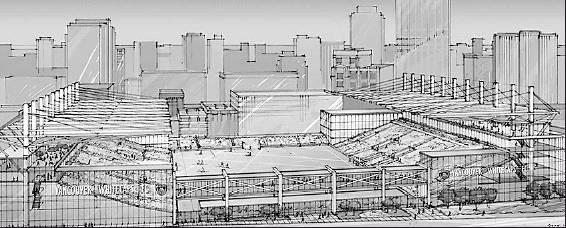STADIUM I More studies not the answer, president John Rocha claims
JEFF LEE
Sun

Artist’s rendering of the stadium with view of North Shore mountains

Artist’s rendering of the stadium with view of North Shore mountains, and the city
Vancouver is at risk of losing the proposed Whitecaps soccer stadium on the downtown waterfront if the city continues to demand planning studies without promising when the proposal can go to rezoning, John Rocha, the team’s president said Thursday.
Rocha said he and team owner Greg Kerfoot understand and support the need for the city to make sure the privately funded stadium, proposed for the land east of the Waterfront SkyTrain station, is appropriate for the area.
But he said delays sparked by the city’s demands for special land-use studies have already cost the team millions of dollars in lost opportunities, including the ability to buy a Major League Soccer franchise, which instead went to Toronto.
“We don’t want to cut any corners, and we want it to be done properly, but our desire is for council to recognize that this is a great community asset that the public wants and that they should commit to it,” Rocha said.
“We want them to give a reasonable time frame and give the project some certainty, because without it, we are not sure we can continue.”
He said the team is losing $6 million to $8 million a year in opportunities, from international sporting events to concerts.
The Whitecaps began trying to build a stadium in Vancouver in 2003, when they were approached by former mayor Larry Campbell, who wanted such a facility. But the project has been plagued by problems that have cost the franchise several lucrative opportunities, Rocha said.
“The challenge has been the process. In no reasonable situation in the world would you have situation where it takes from 2003 to only get to this stage,” he said.
The Whitecaps originally wanted the stadium ready for 2007, when the FIFA Under-20 World Cup will be held in six locations, including Canada.
The city directed the Whitecaps to city-owned land at the east end of False Creek, but then decided not to sell it, Rocha said. As a result, Kerfoot bought seven hectares (18 acres) of Canadian Pacific rail yards along the waterfront.
The stadium would be built over the railway, which would continue to operate.
As a result of the delays, the FIFA event went to Toronto, which won a World Soccer League franchise.
Toronto quickly approved a $65-million stadium on the Canadian National Exhibition lands, chipping in $9.8 million in money, and $9 million in donated land. The federal and Ontario governments kicked in a total of $36 million. The rest was from private funds.
The Whitecaps would likely have received that federal funding if its stadium had been fasttracked, Rocha said.
Kerfoot is pressing ahead with plans to build the Whitecaps facility with private funds, but isn’t ruling out the possibility of asking for similar government support, said Rocha, who estimated the cost at $60 million to $70 million, not including the property.
This week, an independent consultant’s report prepared for city council identified major, but solvable problems with the new Whitecaps proposal.
City staff are recommending the project only be considered when those problems are fixed, and only after a major new study on the future of the waterfront lands and rail yards.
The consultants identified five major issues:
The provision of an adequate street network.
Resolution of the risk of moving dangerous goods under the stadium.
Reconfiguration of the stadium to make it fit better with neighbouring Gastown.
Resolution of negative impacts on people living nearby.
Resolution of the impact the stadium would have on development of nearby port lands.
Trish French, the city’s assistant director of current planning, said she understands the Whitecaps’ concerns but the project is complex.
“We can’t ensure their viability. What we can do is make best efforts to resolve the issues with them on a timeline that we can develop in detail. We’re doing our best. I think the city’s attitude with major developments is that we have to do it right. This is a major development in a contentious location.”
She said the new study affects the future of a wide area, but the Whitecaps’ issues could be resolved earlier.
“The full study is slated for about 18 months,” she said. “What we are saying to the Whitecaps is that it may be possible by around 12 months to have a solution to these particular issues that are affecting them.”

